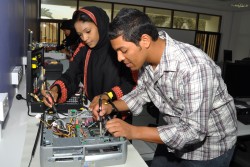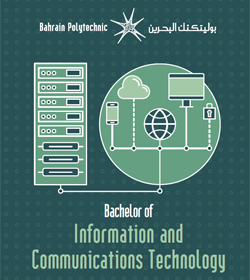- Diploma Degree 4 Semesters (Full-Time) – 240 credits
- Bachelor Degree 8 Semesters (Full-Time) – 480 credits
Programme Entry Requirements
Applicants must achieve the minimum requirements in the English and Mathematics entry tests OR passing Maths and English courses in the Foundation programme.
Course FeesApply Now
Introduction and Programme Aims
 The BICT Programme aims to develop work-ready and skilled graduates who have a broad range of technical competencies. The focus is on practical, hands-on skills, backed by industry relevant partnerships that ensure the programme has the most up-to-date content. Each course has underlying concepts developed through a mixture of activities and assessed using methods that closely model professional practice.
The BICT Programme aims to develop work-ready and skilled graduates who have a broad range of technical competencies. The focus is on practical, hands-on skills, backed by industry relevant partnerships that ensure the programme has the most up-to-date content. Each course has underlying concepts developed through a mixture of activities and assessed using methods that closely model professional practice.
Majors
To view the courses of each major, please click on the links below.
- Database Systems
- Management Information Systems
- Networking
- Programming
- Cybersecurity
Graduate Profile
Graduates of the BICT Programme will have the following qualities:
- Hold core ICT technical skills.
- Acquire knowledge of the latest information and communication technology.
- Apply the latest ICT knowledge to effectively operate existing systems.
- Analyze business problems.
- Design and evaluate new systems according to requirements.
- Develop ICT solutions according to design.
- Work according to a range of international professional codes of conduct.
- Recognize the professional, moral, and ethical issues involved in utilizing computer technology.
- Apply resourcefulness, innovation and strategic thinking to a range of workplace situations.
- Readiness for professional assessments and certifications.
- Be a communicative, resourceful and a lifelong learner.
Career Opportunities
The BICT programme prepares students for the following careers:
Database Systems
- Data Analyst
- Databases Developer
- Database Programmer
- Database Administrator
- Database Architect
- Data Miner
Management Information Systems
- IT Systems Analyst
- IT Systems Administrator
- IT Systems Architect
- IT Systems Engineer
- Data Center Specialist
- IT Project Manager
Networking
- Network Administrator
- Information Security officer
- Information System Security Officer
- Network Infrastructure Manager
- Network Engineer
- 3G/4G Integration Engineers
Programming
- Software Developer
- Software Engineer
- Software Systems Developer
- Games Developer
- Mobile Application Developer
- Web Developer
Teaching and Assessments
The Polytechnic uses a student-centered approach to teaching and learning in which the curriculum is designed to help the students engage in the learning process using inquiry and problem-based learning strategies. We endeavor to create a classroom environment where everyone is engaged and free to express their opinion and share their knowledge. The role of the tutor is to facilitate learning activities in which the tutor guides the students. The ICT courses use a blended learning approach which consists of face-to-face classroom-based learning, online supported delivery, project-based learning, job placement, internships, individual work, group work, and student-centered learning. An emphasis is placed on related practical projects in all years of the programme.
Summary of Programme Structure
The BICT programme is split into three phases. During the first three semesters, students concentrate on developing a broad technical skills base. Since the programme is delivered in English, there is a high level of English support in this period. During the second phase, students choose a major in which they want to specialize in and undertake subjects related to their area of specialization. The last year of the programme is entirely dedicated to project work, giving students the opportunity to consolidate the knowledge gained in the previous three years. In Semester A of Year 4 students undertake a significant Capstone Project course at Bahrain Polytechnic Innovation Lab. The Capstone Project is either proposed by a faculty member, the student, or an industry partner. The course incorporates Project Management, Technical Writing, and English Communication to prepare the students to undertake an ICT work placement.
Specific courses being delivered in this programme can be found at the Polytechnic’s website under “Bachelor of Information and Communications Technology”.
Work Placement
During the second semester of the final year, students have one of three options. They can undertake: a Cooperative Learning Project and work at an industry partner’s premises, a Research Project and work at Bahrain Polytechnic Innovation Lab, or an Entrepreneurial Project and work at an incubator or business accelerator. Each student will undertake a four months project or multiple small projects related to their major in which they would have analyzed, gathered requirements, designed, implemented and tested ICT solutions.
Qualifications
- Diploma of Information and Communications Technology
- Bachelor of Information and Communications Technology (Database Systems)
- Bachelor of Information and Communications Technology (Management Information Systems)
- Bachelor of Information and Communications Technology (Networking)
- Bachelor of Information and Communications Technology (Programming)













